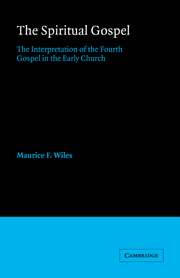Book contents
- Frontmatter
- Contents
- ACKNOWLEDGEMENTS
- ABBREVIATIONS
- INTRODUCTION Commentaries and commentators
- I The authorship and purpose of the Gospel
- II The Fourth Gospel and the Synoptic Gospels
- III Historicity and symbolism
- IV The signs
- V Leading ideas of the Gospel
- VI The Fourth Gospel and the Gnostics
- VII Christological interpretation in the third and fourth centuries
- VIII The Christological exegesis of Theodore and Cyril
- IX The Gospel of salvation
- EPILOGUE An assessment
- BIBLIOGRAPHY
- INDEX OF PROPER NAMES
- INDEX OF TEXTS
EPILOGUE An assessment
Published online by Cambridge University Press: 06 March 2010
- Frontmatter
- Contents
- ACKNOWLEDGEMENTS
- ABBREVIATIONS
- INTRODUCTION Commentaries and commentators
- I The authorship and purpose of the Gospel
- II The Fourth Gospel and the Synoptic Gospels
- III Historicity and symbolism
- IV The signs
- V Leading ideas of the Gospel
- VI The Fourth Gospel and the Gnostics
- VII Christological interpretation in the third and fourth centuries
- VIII The Christological exegesis of Theodore and Cyril
- IX The Gospel of salvation
- EPILOGUE An assessment
- BIBLIOGRAPHY
- INDEX OF PROPER NAMES
- INDEX OF TEXTS
Summary
There is no title that the Fathers would have coveted more for themselves than that of Biblical theologians. Later scholars may point with justice to the influence of Greek metaphysical thought upon their writings and their understanding of the Gospel, but in conscious aim and intention their overriding purpose was to interpret the message of the Bible. We have studied some of their greatest representatives consciously engaged in executing that work of interpretation upon what they and the consensus of opinion in the Church after them have normally regarded as the greatest of the books of Scripture. How are we to assess and to evaluate their work as commentators?
First of all, the acuteness of observation and attention to detail, which is a general characteristic of all their work, must be quoted as a valuable mark of all the commentaries. In almost every discussion of the commentaries with which we have been concerned, this point is noted as a meritorious feature of the work in question. With so carefully constructed a writing as St John's Gospel, this is an indispensable characteristic of the good commentator.
Nevertheless there are other even more important elements in the equipment of the good commentator, and these are not so universally present in the work of the Fathers. Of prime importance is a certain breadth of spiritual discernment, which can appreciate the deep theological character of the author's thought and which recognises that he is seeking to express ultimate truths about the divine dealing with the world, which are not and cannot be perfectly amenable to any one system of human logic.
- Type
- Chapter
- Information
- The Spiritual GospelThe Interpretation of the Fourth Gospel in the Early Church, pp. 158 - 161Publisher: Cambridge University PressPrint publication year: 1960



